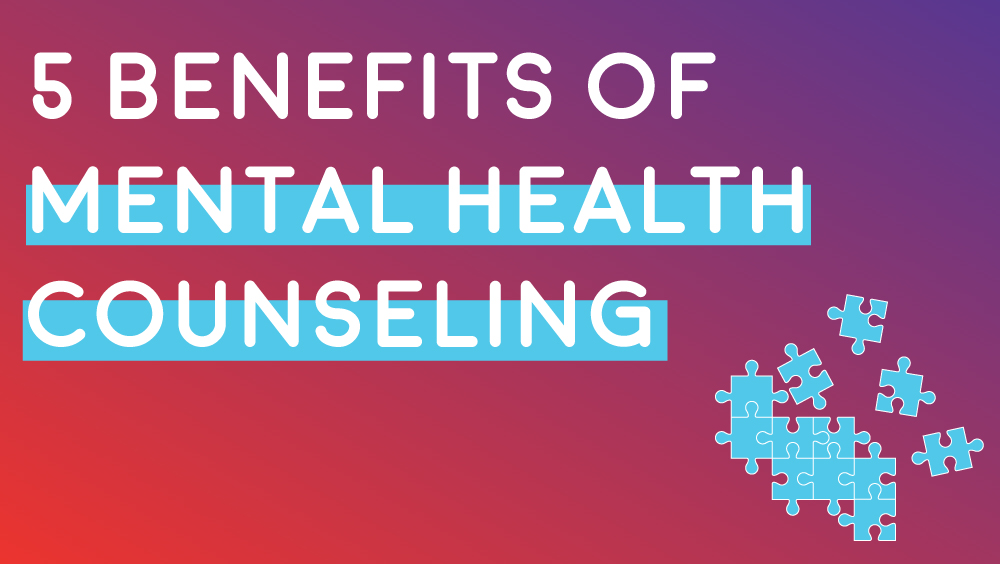All about Mental Health Counseling
Table of ContentsAbout Mental Health CounselingNot known Details About Mental Health Counseling Getting The Mental Health Counseling To WorkMental Health Counseling - QuestionsExamine This Report on Mental Health Counseling
Via treatment, you can gain insight into your own patterns of habits and communication, which can bring about more satisfying and satisfying partnerships with good friends, family, and charming companions. What we believe, we show up. If you're consumed with unfavorable emotions and unfavorable thoughts that are interfering with your life, treatment can assist., or there are various other unfavorable ways you behave. Treatment can assist you change those behaviors that are having a negative impact on your world and connections.

Getting therapy to resolve certain facets of your life can help you be extra efficient in various other locations, including work.

What Does Mental Health Counseling Do?
There are also extra benefits of treatment than simply the ones we have gone over., or construct partnerships (charming or those with family or close friends) in a healthy way.
For the function of the here and now research study, regarded benefits and barriers to psychological health and wellness help-seeking are being discovered. Previous study discovered that viewed barriers have a significant impact on university students' health and wellness behavior selections (Von Ah, Ebert, Ngamvitroj, Park & Kang, 2003). Regarded benefits and obstacles to help-seeking were particularly picked as a result of their influence on decision-making and inevitably action (Glanz, Rimer, & Su, 2005).
Today research seeks to take a look at whether preconception acts as a barrier to therapy amongst university trainees. Eisenberg et al. (2011) proposed that uncertainty regarding therapy efficacy is one more barrier to taking part in therapy. Study findings disclosed that university student endorsed several barriers to joining therapy. Mental Health Counseling. Amongst these were: (1) favoring to take care of psychological health issue themselves, (2) not having adequate time to join therapy, (3) inquiries about whether mental wellness therapy works in remediating troubles, (4) an idea that stress and anxiety is normal or the issue will certainly improve without treatment, (5) lack of cash, and (6) stress about what others would certainly assume if they discovered treatment engagement.
(2006) reported comparable variables as barriers to looking for therapy and additionally discovered that a skepticism of providers might impede students from looking for help. Team in school mental wellness centers might be viewed as unfriendly, and long wait times for services may be "off-putting" for students. Aspects helping with a lot more positive perspectives are usually at the contrary pole of those factors determined as obstacles.
The Greatest Guide To Mental Health Counseling
One in three (34.6%) reported surviving on university and one in four (23.3%) reported living with parents. Nearly fifty percent of pupils were associated with university organizations and 1 in 10 reported remaining in a fraternity or sorority. Even more than one-third of trainees (38.1%) reported that they had a relative or pal with an identified psychological wellness disorder.

How Mental Health Counseling can Save You Time, Stress, and Money.
Univariate F-tests identified certain subscale things that considerably differed. Ladies were less likely than men to regard individuals who go to therapy as emotionally weak, people who go to counseling as insane, to feel that people with psychological health issue must manage troubles by themselves, that people that most likely to counseling as unable to solve troubles, that people who go to counseling slouch, and to feel that individuals who go to counseling are different from typical individuals in an unfavorable method.
Likewise, study results revealed that ladies were dramatically much less most likely than males to hold stigma-related mindsets. This follows previous research which additionally found that males hold greater levels of perceived preconception than ladies (Chandra & Minkovitz, 2006). Based upon study findings, it appears that men might be less most likely than women to look for treatment due to reduced perceived barriers in addition to high stigma-related perspectives.
Get This Report about Mental Health Counseling
In addition, university wellness experts might provide academic programs targeting males with information on the benefits of psychological wellness treatment and the significance of seeking help when required., the existing research found no substantial differences in the number of perceived obstacles to help-seeking habits based on sex.
Scientist guess that this is mainly as a result of typical social norms and gender functions that defined men based upon toughness and absence of emotional expression (Addis & Mahalik, 2003; Ang, Lim, Tan, & Yau, 2004; Mojtabai, 2007). Overall, there have actually been mixed outcomes among the university student population pertaining to sex distinctions Recommended Reading (Rosenthal & Wilson, 2008). This finding was unexpected and can highlight that those who had received therapy had a much better concept of delay times and other "gain access to" obstacles that may make it hard to start treatment. Perhaps, individuals who have actually obtained More Bonuses therapy sight extra barriers than participants that have not obtained therapy because looking for therapy solutions once more might entail worry of self-disclosing individual information to a brand-new counselor.